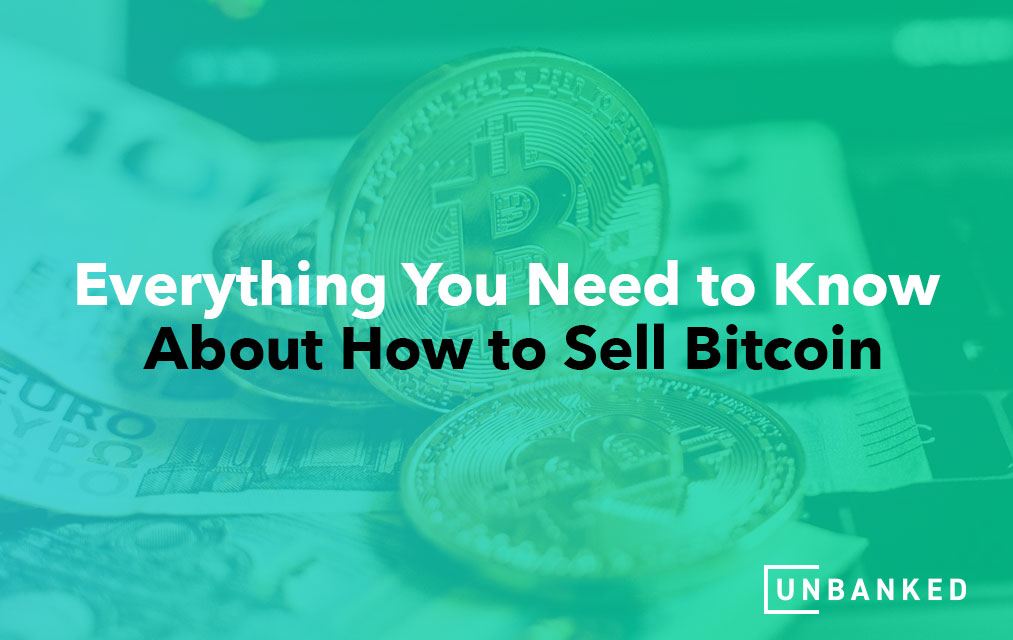Have you bought Bitcoin? If so, you might be thinking about cashing in.
A year ago, you would have bought bitcoin at around $3,000. Today, that same amount could be sold for a little over $9,000. That’s a pretty good payoff.
While buying bitcoin is pretty straightforward, selling it is a whole other story. There’s a lot you need to know. Follow the tips below if you think you’re ready to cash out your bitcoin.
Where Can I Sell my Bitcoin?
There are a few options that each come with their own distinct advantages and disadvantages.
- Exchanges
- In-person via trade
- BitCoin ATMs
- Peer-to-Peer Trading Marketplaces
Below, we’ll go into a bit more detail about all of the places and methods as well as the benefits and pitfalls that come with each.
Exchanges

Bitcoin exchanges are a pretty quick one-stop solution when it comes to selling. These exchanges hold both the seller’s and buyer’s funds, making it pretty easy to make the sale.
Setting Up Your Account
If you choose to go through an exchange route, you need to set up an account. Most reputable exchanges will verify your identity. They’ll also ask for you to connect a bank account. This way, you can easily withdraw your funds.
Making an Offer
After you set up an account, you can place a “sell offer” that lists the currency you want to trade and the asking amount. Once someone matches your offer, the exchange will complete the transaction automatically.
Withdrawing Funds
Once the funds are in your account, you can withdraw them into your bank account. Be aware, sometimes this takes a long time.
Depending on the exchange you choose, you’ll need to pay a fee. These fees vary drastically depending on the exchange itself, the transaction, and the bank you use.
Most of the time, there is also a limit on the amount of money you can store in your exchange account. However, if you’re loyal to an exchange, that limit will increase over time.
Keep in mind, many hackers keep an eye on exchange accounts. Therefore, an exchange is a less reliable place to store your funds. It’s important to immediately transfer them over to your bank account after a transaction.
Some bitcoin exchanges to look into:
- Bitfinex
- Bitstamp
- CEX.IO
- Coinbase
- GDAX
- Kraken
Trades
You could decide to make a direct trade with another person. You can access trade services through websites associated with exchanges.
If you want to do a direct trade, you need to first register as a seller. Again, you’ll be asked to verify your identity. From there, you can post an offer. When a buyer wants to trade, you’ll get a notification.
The website only serves as a platform to make a trade. The process itself is time-consuming and very involved. Make sure if you do your research when deciding on a trade site.
- BitBargain
- Bittylicious
- Coinbase
- Open bitcoins
- Bitsquare
- LocalBitcoins
How to Sell Bitcoin in Person
In theory, selling bitcoin in person is an easy way to cash in. Once you find a buyer, you just scan a QR code onto their phone in exchange for their payment.
However, use caution. This is a great option if you’re selling to someone you know, like a friend or family member.
Selling to a person you don’t know can be tricky. You need to find a buyer through an online forum and make sure they’re trustworthy. You might want to consider finding a local Bitcoin group to make a transaction instead.
If you’re meeting in person, be cautious and safe. Meet in public areas and take someone with you. Carrying around Bitcoin has just as many risks as carrying around a wallet full of cash.
Bitcoin ATMs
Just like banking ATMs, Bitcoin machines are like little “holes in the wall.” They’re just as easy to use, too. In the simplest terms, they instantly give you cash in exchange for your Bitcoin.
That being said, there are a few drawbacks. There aren’t too many around, so you might have to hunt one down. Some countries don’t even have Bitcoin ATMs. Once you find one, you might find that it’s set up to sell digital currency, not exchange it for cash.
These machines also charge a lot of interest to sellers. Often, it’s up to as high as 15%.
While the concept is simple, it’s also not always direct. You might need to offer up an ID or take your photo at the machine. And in the end, you might not even get cash immediately. The machine may give you a code to redeem for cash later.
Peer to Peer Trading Marketplaces
This is a new concept in the Bitcoin world. Unlike exchanges, these websites bring people together based on complementary needs. These sites work to benefit both those who want to buy Bitcoins and those who want to spend them.
You would use these websites if you want to purchase items with your Bitcoin from places that require traditional payments. Then, you put out your wishlist of items you want to buy at a discount.
Someone may come along and decide to accept a trade for your wishlist. They pay for your items through the marketplace and use your address as shipping. Once the package is delivered, the marketplace takes money out of escrow and transfers the Bitcoin to the buyer.
You get to buy the products you want at a discount with your Bitcoin. The person you traded with gets the Bitcoin they wanted to buy.
Some websites that offer this are:
- Purse
- Brawker
- OpenBazaar
Stay Safe
Now that you know how to sell your Bitcoin, you need to make sure you and your money are safe.
If you meet in person, make sure you meet in a public place. Don’t go to a person’s home and don’t go alone. If you choose to exchange or trade online, use a reputable site. Do your research to make sure they have safety measures in place. Make an exchange or trade with someone who can prove they are trustworthy with a track record.
Remember, carrying around Bitcoin is a lot like carrying around a wad of cash. Be careful, be safe, and trade smart. Get a BlockCard to help keep your money safe and sound.
BlockCard seeks to provide readers with objective advice regarding all aspects of cryptocurrency. We source data points, trends and statistics from a variety of sources including but not limited to online publications such as Forbes, Bitpay, Crypto.com, and CoinDesk and have to make informed interpretations. Ultimately it is up to users to understand the risks or potential gains that come with any cryptocurrency transaction whether it be buying, selling, or paying with cryptocurrency. This piece does not contain all information necessary and should be considered for informational purposes only.





